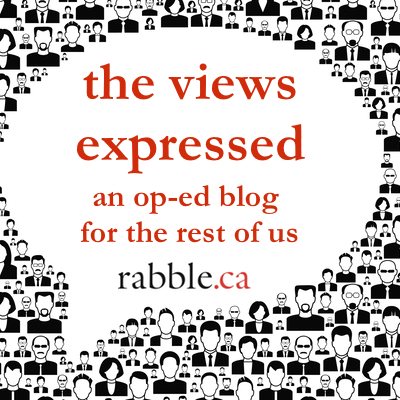The discussion about sexual violence and sexual harassment is ongoing.
Writing and reading about the Jian Ghomeshi allegations continues, as do discussions about the CBC, sexual harassment, and sexual violence. The story has cracked our collective shell; information feminists have shouting for decades is emerging into the mainstream.
Jesse Brown continues his work tracking allegations and looking for investigative journalists to help substantiate the claims. He also produces a podcast called Canadaland. I listened to episode 56, the other day to hear Brown’s discussion with Roberto Veri, who worked at Q and witnessed some of what’s been reported in the paper.
Around the six-minute mark in that interview, Veri described watching Ghomeshi harass a co-worker, who was also a friend. Veri was not the hero in his story. Though he had clearly been horrified by the harassment, he also described remaining silent as Ghomeshi humped a fellow producer from behind as she stood at her desk, presumably with other producers nearby as well.
It was notable to me that a bystander who had not stopped the harassment had agreed to describe the situation, and his involvement in it. How many times have you witnessed injustice and done nothing, or felt that you could not speak up? How many times have I? What hasn’t changed is this: when you’re not the captain, it is terrifying to rock the boat.
“The only good outcome of this is justice for victims,” said Veri, and Brown seemed to agree.
What I heard from these two men was this: stoic acceptance of a painful fact of life. The two of them seemed to feel it inevitable that everyone will sometimes witness harassment; there’s nothing to be done about it. Sexual harassment exists in the workplace, and the best that can be hoped for is justice for the victims.
I hope for justice too, but it’s certainly not the best thing I can hope for. In fact, it is only one of my hopes for what might grow from the pile of crap this news story has revealed.
I imagine a system changed. I imagine that more the open discussion of harassment happening now will create a more compassionate society, where women are not treated as playthings or possessions and where men can express themselves without sexually harassing and silencing others. Where anyone in a position of authority joke-humping a co-worker would bring a room to a standstill, and no one would feel obliged to protect their career by turning their head down and away.
No one likes to acknowledge they benefit from harassment in the workplace. The same system that leaves harassment socially acceptable makes women less likely to succeed. By not taking any action to stop harassment, a bystander is essentially reducing their competition in the workplace.
So many of us benefit from the social hierarchy.
We all need to be bolder. We need to take a personal risk to act for prevention over punishment. With so many people experiencing sexual harassment by those close to them, we need to hold the harassers accountable but also give them the opportunity to change; for now, in most cases, they’re going to be in the office sitting alongside us the next day.
Most women have endured sexual harassment at some level of intensity. There has been a lot of writing about how women share stories and warn other women. Let’s also admit that we don’t always support our sisters when they come forward. Hopefully #beenrapedneverreported, and the reporting around the Ghomeshi allegations will change that.
Since the news broke, I’ve been on a hunt for instructions for creating safe spaces. Sadly, so far my inquiries have come up with very little. Google “safe workspace,” and you get a lot of pages talking about ergonomics. But some resources do exist for creating an equitable, welcoming workspace.
We can make this a transformational moment. By discussing consent, talking about power dynamics, how to participate rather than stand idly by, and by rewarding people who report harassment with support instead of questions, we can stop this from happening again in another workplace, home or street.
I hope that you take up this call to engage in this struggle — at the very least speak up in support when your friends tell their stories. At work, at home, and in the wider community, let’s respect each other and expect each other to respect each other.
Talk about safe space. Make it happen by creating or sharing some resources that focus on what we can do, rather than what we shouldn’t.
I look forward to the day when I can go through a day without deciding if I feel safe enough to intervene.
Meagan Perry is the editor-in-chief of rabble.ca. You can find her @Freakinperry. If you have resources for creating safe environments at your disposal, send them to [email protected], we’ll add them to our activist toolkit.



